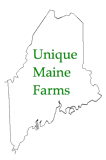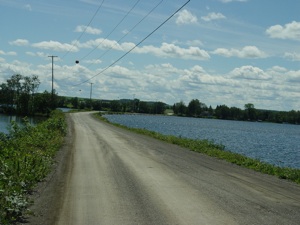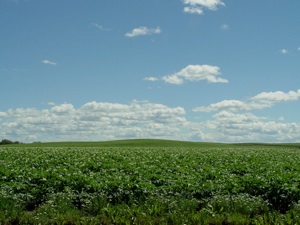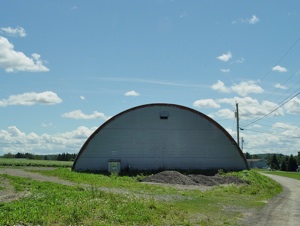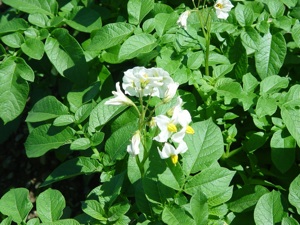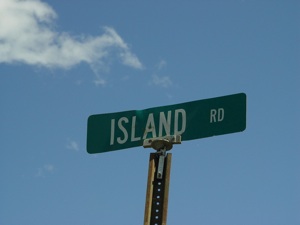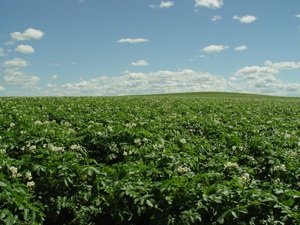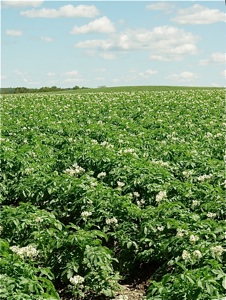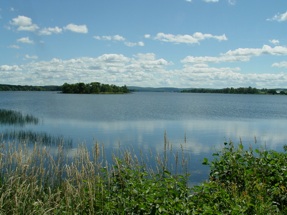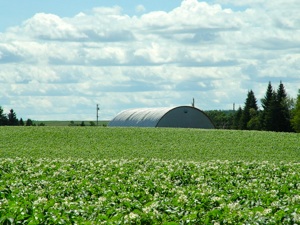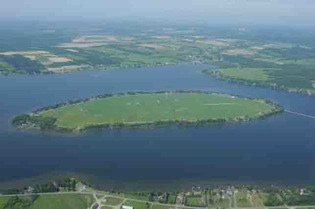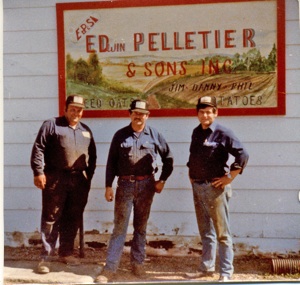Name: Pelletier Island Farm
Island Farm Address:
Pelletier Island Farm
Long Lake
St. Agatha, Aroostook County
Mailing Address:
P.O. Box 133
352 US Route One
Frenchville, Maine 04745
Phone: 207-543-7702
Fax: 207-543-3908
Email: epelletier@myfairpoint.net
Products and Services:
-table stock potatoes - four varieties
-seed potatoes
-potato grower
-grain wholesaler
-shipper
-packaging
-selected seeds - oats
-selected seeds - barley
-island farmers for over sixty years
What Makes Pelletier Island Farm Unique?
It may come as a surprise that hundreds of acres of potatoes or grains are grown each year on a farm on an island in Long Lake in Saint Agatha in Aroostook County. This island farm, which is located about one-half mile from the eastern shore of the lake has a fascinating history that goes back to the time when Edwin Pelletier of Frenchville purchased the island. Being so isolated, Edwin Pelletier viewed the island as a perfect location to grow seed potatoes that would escape any kind of contamination or disease.
Because Edwin Pelletier was looking to establish his own farm and the farm property in Frenchville was very reasonable, he moved from New Canada to establish the home farm in 1938. Edwin and Etienette (Rioux) Pelletier raised five sons and three daughters. Danny Pelletier, the youngest son of Edwin and Etienette, described how his father planted a couple of acres of seed potatoes during the first year on the Frenchville farm and stored them in the basement of his house. As the years went by, he acquired more land to farm.
Danny stated that in the 1960’s, there were 250,000 acres planted in potatoes in the state compared to the 52,000 to 54,000 pounds of potatoes that are now grown. Because many farmers were also growing grain at the time when Edwin moved to Frenchville and some of the land was forested, there was not an excess of available farmland so the land on the island seemed like a great spot.
According to Danny, after his father purchased Pelletier Island in 1952, he farmed on the island for six years before he decided to build the causeway. Prior to the construction of the causeway, a large platform pontoon type of ferry with an attached motor was built to transport the farm machinery over to the island. A smaller ferry transported people to the island.
Building the causeway was quite labor intensive. Edwin hauled truckloads of gravel and rocks for a continuous month. Even though the causeway was not the shortest route to the island, it proved to be the recommended route because water depth tests had been taken and a good portion of the causeway could be built in shallow water. There were areas of the lake that reached down nineteen feet. In the early days the causeway was only one lane and not very high. In the spring when the lake water rose, Danny commented that it was not unusual for two feet of water to cover the causeway.
Danny Pelletier was only two years old when the causeway was built. He shared how, while growing up on his family farm, that they had cattle, pigs, and chickens. His mother tended a big vegetable garden with some help from his three sisters. At that period of time just about every family in the area were growing potatoes. The potatoes were picked by hand until mechanization took over.
Edwin Pelletier passed away in 1977, but three of his sons, Phil, Jim, and Danny, continued to farm the land on the island and the many acres that they cultivated throughout the Frenchville area. Leo James “Jim” Pelletier passed away in 2010, so the farm is now managed by Danny and Phil. Danny’s four children (Jacob, Jeremy, Jeffrey, and Jessica) all helped out on the family farm when they were young, but now only Jacob and Jeremy have continued to work on the farm. In addition to co-owners Danny Pelletier and Phil Pelletier, there are eight full-time employees on the farm including two drivers and a secretary.
At the present time, Edwin Pelletier and Sons cultivate about 165 acres of potatoes on the island. When oats and barley are grown on the island as rotational crops, about 180 acres are cultivated. The Pelletiers grow an additional 385 acres of potatoes on other farms around St. Agatha and in the townships and near Cross Lake. They also grow about 1100 to 1200 acres of grain. Their grain is sold wholesale to people who deal in feed grain. About one-third of their grain crop is used as seed grain. Some farmers rent them their land for rotational crops on their land.
The farm operation has expanded dramatically since the days of Edwin Pelletier storing his potatoes in the basement. The Pelletiers have built up quite a potato packing operation. They work closely with Food Safety Primus who provides technical services related to the safe production and handling of their potatoes. They package half of their potato crop into small five and ten pound packages. They also sell many of their potatoes to wholesalers who pack them. They grow Russet Norkotah, two varieties of white potatoes, and one yellow variety. The majority of their potatoes are shipped out of state on the East coast. They have a few trucks that help with the transportation of their crops.
The Edwin Pelletier and Sons farm was named the Outstanding Conservation Farm of the Year in 2012 by the St. John Valley Soil and Water Conservation District. The Pelletiers assisted with helping to re-direct some of the washoff going through their fields that was contributing to the contamination of McLean Brook that was feeding into Long Lake. They helped to filter the water and also build a supplementary pond. Grants were acquired to help with the costs of this conservation work.
Danny Pelletier learned to farm from hands-on experience. He explained that he never really enjoyed school, but does regret that he had not continued on with his education in some respects. He commented that the farm has survived and he attends meetings on farming when time allows.
While commercial farming on an island seems quite unique, Danny Pelletier mentioned that there were two island farms that used to operate in the St. John River. One of the island farms was located behind his house in Frenchville, but the causeway to that farm washed away. Another island farm is located in the Grand Isle area, but it is only accessible when the water is low.
Because the idea of island farming seemed so intriguing, Unique Maine Farms researched island farms in the St. John Valley and was surprised to learn about the very productive agricultural operations back in the late 1800’s on the Seven Islands of the St. John River. They were home to large grain, sheep and beef farms that sold their products to people working in the woods. Many of these islands are now covered with trees. Pelletier Island has the distinction of continuing to be the home of a very successful potato and grain farm that has been operated by the late Edwin Pelletier and his descendants for over sixty years.


